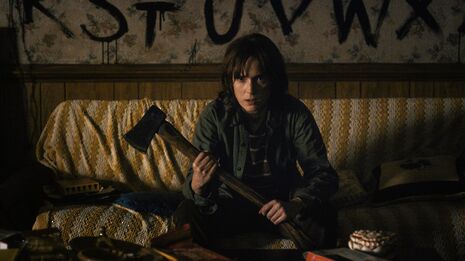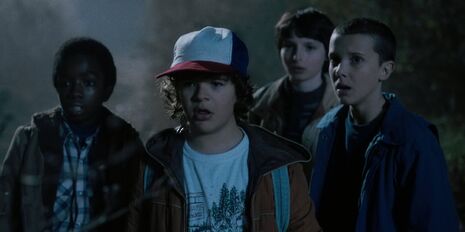TV: Stranger Things
A thrilling, genre-crossing murder mystery that mixes modern day fears with 80s pop culture

Things that go bump in the night are no longer the only things that scare us. Our fears and anxieties extend much further than ghosts and axe-wielding psychopaths, towards something more corrupt, contemporary and political. This is what the extraordinary Stranger Things proves. The Duffer Brothers’ highly-acclaimed sci-fi horror series, released this year on Netflix, begins with the simple tale of a boy gone missing in your classic small American town. But, by the time you have finished this exhilarating first season, you will have experienced something much more profound and disturbing.
When twelve-year old Will Byers disappears from Hawkins, Indiana, all hell breaks loose. Aided by the vulnerable Eleven (Millie Bobby Brown), a mysterious shaven-head girl with telekinetic powers, Will’s three friends set off on a mission to find him. Meanwhile, two other search parties take shape: his frantic mother (Winona Ryder) assisted by Chief Jim Hopper (David Harbour), and Will’s teenage brother Jonathan (Charlie Heaton). Plagued by their own doubts and fears of going insane, the three groups desperately attempt to uncover the truth. As more and more ‘strange things’ take place over the eight episodes, it is clear that there is a lot more to the vanishing of Will Byers than meets the eye.
That Stranger Things has gained something of a cult following is a testament to its intelligently crafted style. Abundant with 1980s film and pop culture references, the series is not only a gripping story within itself, but also a successful homage to arguably the best decade of horror and sci-fi cinema. This is not simply an aesthetic tribute through appropriate fashion and on-set décor, but through the chosen motifs that allude to the masterpieces of directors and writers such as Stephen King, George Lucas, Stephen Spielberg and John Carpenter. We are reminded of the telekinesis of Carrie, the extraterrestrial terror from Alien, the terrifying dream realm in A Nightmare on Elm Street, and the coming-of-age relationships from Stand by Me. But whether or not you are a self-proclaimed 80s expert, Stranger Things is an immense pleasure to watch.
Similar to the eccentric American Horror Story in its genre allusions, but with much greater heart, the series is a triumph on numerous levels; the performances alone are enough to guarantee that it will be remembered in the Netflix hall of fame. Winona Ryder expertly portrays the heartbreaking trauma of a mother who has lost her child, expressing a desperation and determination that is almost unbearable to watch. Although sometimes bordering on a bit too hysterical to the point of over-acting, on second consideration this is only what would realistically be expected of a mother in her situation. Ryder’s co-star David Harbour shares her talent in playing a grieving parent, but displays it in a different and yet equally memorable manner.

However, the real stars of Stranger Things are the group of children who courageously, and often more effectively, hunt for Will. Mike, Lucas, Dustin and Eleven (‘El’) do not act as innocent counterparts to their parents and the authorities, but instead are the real brains behind the unraveling of the mystery. The Duffer Brothers’ have created an inverted world where children are adults and adults are children, where adults work with a simple reality in front of them and children look beyond what they are told, sacrificing themselves for the sake of others and suffering in the toxic parallel world, the ‘Upside Down’. This exploration of alternate universes is what makes Stranger Things so effective within the sci-fi horror genre.
Horror has always been neglected in the scope of film academia, let alone in genres taken seriously by wide audiences. It is rare that a horror film has ever landed the title of a ‘classic’ alongside our Casablancas and Citizen Kanes, and on the occasion that it has, it seems that this is often due to its features outside of the horror genre – Psycho is renowned for its shocking plot twist more than its contribution to horror film history. And yet, as Stanger Things shows, the horror genre, as well as sci-fi cinema, is fascinating for what it shows us about universal fears and public anxieties. Although in some ways an elaborate story about impossible occurrences, it is the underlying relevance of Stranger Things to American society and the wider world that makes it so frightening.
With the backdrop of the Cold War and the emerging technological age, Stranger Things is ultimately a story in honour of America’s victimised children, forced to pay the price for political ‘experiments’ and violence as Eleven is in the Upside Down, something that is as relevant today as it was in the 1980s. Perhaps the Duffer Brothers are reminding their viewers to wake up and see the terrifying reality and impact of issues such as America’s gun laws on the younger generation. In this case, the only question left to ask is: how do we now escape from our own Upside Down?
 Comment / The (Dys)functions of student politics at Cambridge19 January 2026
Comment / The (Dys)functions of student politics at Cambridge19 January 2026 Arts / Exploring Cambridge’s modernist architecture20 January 2026
Arts / Exploring Cambridge’s modernist architecture20 January 2026 Features / Exploring Cambridge’s past, present, and future18 January 2026
Features / Exploring Cambridge’s past, present, and future18 January 2026 Theatre / The ETG’s Comedy of Errors is flawless21 January 2026
Theatre / The ETG’s Comedy of Errors is flawless21 January 2026 News / Local business in trademark battle with Uni over use of ‘Cambridge’17 January 2026
News / Local business in trademark battle with Uni over use of ‘Cambridge’17 January 2026







